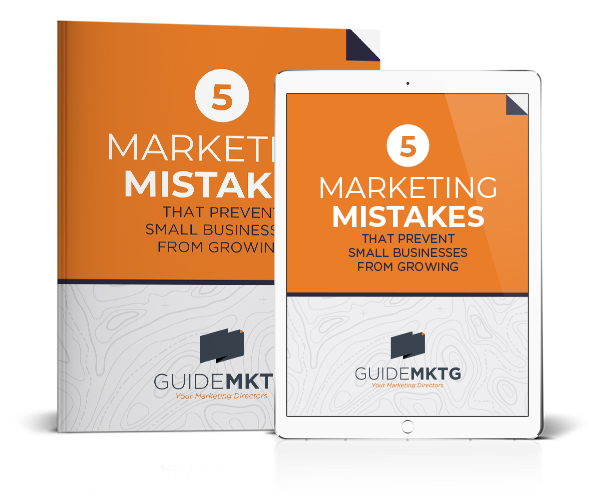It’s no secret that COVID-19 and the subsequent economic downturn have had a serious impact on small businesses. According to Vice President Kamala Harris, almost 1/3 of small businesses closed their doors during the pandemic. Here are five tips to ensure that doesn’t happen to you when a crisis hits. You can recession proof your small business and continue to thrive, even during tough times.
How to Recession Proof Your Small Business
You’ve worked hard to grow your business. As a business owner, the last thing you want is to have to close your doors or lay people off because of economic downturns.
We’re in the same situation here at Guide MKTG.
The advice given to owners is to look into financing options to secure capital, create multiple revenue streams or use personal credit.
Thankfully, it doesn’t have to be that complicated or risky, and you don’t have to wait until a recession hits to get started. Here are five tips to proactively recession proof your small business so that you can rise above the economic situation, and even keep growing your business, during a recession.
Tip 1: Define what is already working well
Often, when a product or service we offer is struggling to perform well, we focus our efforts on improving that offering until we get it right. (Especially if we’ve been told creating multiple revenue streams is the key to survival during a recession.)
What if, instead of spending your time agonizing over what isn’t working, you dedicated your time to strengthening what is already going well?
The reality is, not all of our offerings will be a success. As the 80/20 rule proves, not everything we try will lead to mind-blowing results. That is a normal part of business — and life.
If you want to keep your business afloat during a recession, shift your focus. Stop aggressively marketing the products, services, and plans that don’t sell well. Instead, focus your time, efforts, and funds on your offerings that are already performing well. If a campaign, product, or service is taking up a large amount of your time and money but isn’t yielding results, it is time to let it go (at least for the time being).
Tip 2: Use clear messaging
During a recession, small business owners aren’t the only ones working to stretch every dollar. Consumers are also hyper aware of how they spend their money. Their top concern is ensuring they buy the right product to fix their problem the first time. Ineffective, money wasting solutions need not apply!
You want to make sure that new customers know exactly what problem your business can solve for them from the minute they stumble upon your website or social media profile. Your goal is to prove that your business is the one they have been looking for. In order to do that, you have to explain your company and your offerings in a way that makes sense to your ideal client.
When we first begin working with a new client here at Guide MKTG, we begin by creating “Clear Company Messaging” based on the StoryBrand BrandScript format. We then use that information to create all other marketing materials.
Starting with clear, customer-centered messaging is always essential to business growth, not just during a recession. As the StoryBrand creator, Donald Miller, says, “If you confuse, you lose”.
People don’t buy the best product. They buy the one they can understand the fastest. So, the best way to recession proof your business and messaging is to make it so clear and simple even a caveman could understand it.
You can create your own clear messaging by reading Building a StoryBrand by Donald Miller and then using the free online software at My StoryBrand to fill out your StoryBrand BrandScript.
Or, if you are struggling to condense all you do down to one, clear story that resonates with your ideal clients, we are masters at clarifying all things complex. Schedule a free 30 minute call today to learn more.
Tip 3: Take great care of your existing customers.
According to Harvard Business Review, it is five to 25 times cheaper to keep an existing client than to go out and find a new one. Improving your customer retention rate by just 5% can get you a 25% to 100% increase in profits.
Translation = customer loyalty is the key to staying afloat and continuing to grow your business during a recession.
However, building customer loyalty doesn’t have to mean developing a points system to incentivize clients to purchase again. You can build customer loyalty by simply listening to what your customers want and then meeting those needs exceptionally well. Walt Disney is credited with saying, “Do what you do so well that they will want to see it again and bring their friends.”
Make sure your entire business knows that client relationships are the key to success. Each time you answer the phone, show up at a client’s door or send an email, think of it as an opportunity to grow. Strive to do such a great job caring for your customers that just getting to interact with you again will be incentive enough for them to come back. This will grow your customer base and gain you loyal clients for years to come.
Tip 4: Stay in Touch
One of the best and most cost effective ways to serve your customers well is to use email marketing to stay in touch with them over time. For new email subscribers, you can use email marketing to educate them on how your product or service will benefit them by solving their problem.
After subscribers have received the introductory information, you should continue to stay in touch regularly through a nurture email campaign. (You’re likely in our weekly nurture campaign right now. If not, download our free guide, “5 Marketing Mistakes that Prevent Small Businesses from Growing,” to be added.) These emails will not only remind your clients and leads that you exist but will also continue to educate, support, and serve them well.
Tip 5: Choose marketing strategies with a big ROI
Since saving money is key during a potential recession, it can feel tempting to stop marketing and focus on getting by instead. However, failing to market your product or service during a recession can impact you for years to come.
There are a few reasons why your marketing budget shouldn’t be the first place you cut costs during an economic downturn. First, recession-proofing your small business is about more than just cutting costs. It’s also about continuing to reach new clients and strengthening relationships with current customers.
Second, targeted marketing is one of the most cost-effective ways to grow your business. Businesses we work with here at Guide MKTG have seen impressive increases in sales after working with us to improve their messaging and define the marketing strategy that will work best for their business.
Finally, good marketing will help keep your business fresh in client’s minds for when the recession ends and consumers start spending again. If your competitors make the mistake of dialing back their marketing, there will be less “noise,” making it even easier for you to stand out. You’ll be the only one out there reminding customers you can solve their problem right now (or as soon as they’re ready to spend).
So, instead of discontinuing your marketing all together, identify what is already working well, listen to what your customers need, clearly explain how you can meet those needs, and then use cost effective marketing tools to stay in touch and continue growing your customer base.
Don’t let a recession close your doors.
Schedule a free 30 minute call today to learn how we can help you recession proof your small business by creating clear messaging and defining the marketing efforts that will get you the biggest return on your investment.
In the meantime, download our “Thriving in Uncertainty” guide for more tips on how to lead your business, and yourself, well during difficult times.





